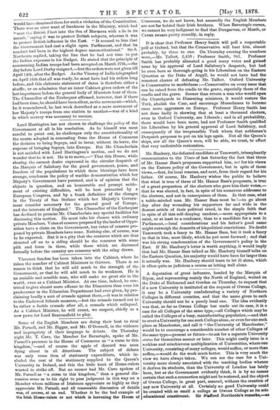Lord Hartingtou has not chosen to challenge the policy of
the Government at all in his resolution. As he himself was most careful to point out, he challenges only the constitutionality of the course adopted in concealing from the House of Commons the decision to bring Sepoys, and to incur, without its leave, the expense of bringing Sepoys, into Europe. But Mr. Chamberlain is not satisfied with Lord Hartington's motion, and we do not wonder that he is not. He is to move,—" That this House, while sharing the earnest desire expressed in the circular despatch of the Marquis of Salisbury for the good government, peace, and freedom of the populations to which these blessings have been strange, condemns the policy of warlike demonstration which her Majesty's Government have pursued, and is of opinion that the objects in question, and an honourable and prompt settle- ment of existing difficulties, will be best promoted by a European Congress, and by a frank definition of the changes in the Treaty of San Stefano which her Majesty's Govern- ment consider necessary for the general good of Europe, and the interests of England." The Chancellor of the Exchequer has declined to promise Mr. Chamberlain any special facilities for discussing this motion. He must take his chance -with ordinary private Members. Votes of censure proposed by the leader of Oppo- sition have a claim on the Government, but votes of censure pro- posed by private Members have none. Nothing else, of course, was to be expected. But it is a pity that the censures which are thus shunted off on to a siding should be the censures with some pith and force in them, while those which are discussed formally before the country are censures with the sting drawn.


































 Previous page
Previous page